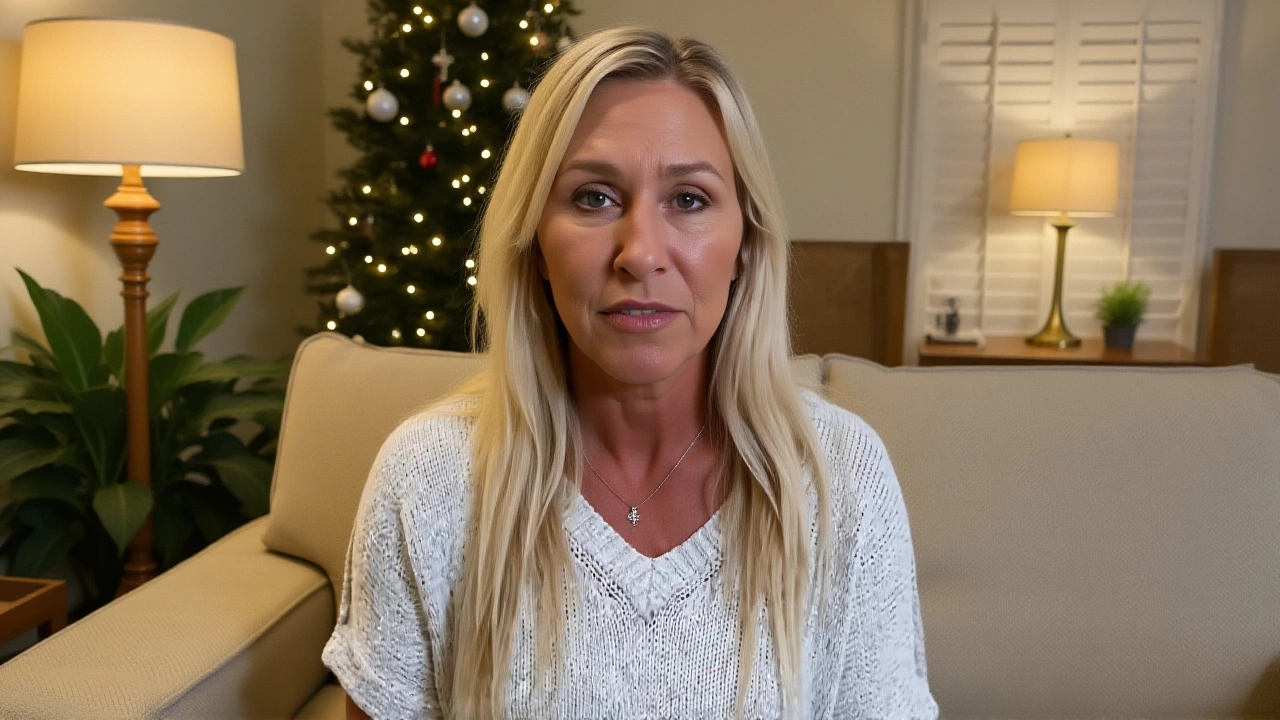When Marjorie Taylor Greene walked away from Congress on Friday, November 21, 2025, she didn’t just leave a seat empty—she cracked open a fault line in the Republican Party just as it was trying to regroup after Donald Trump’s return to the White House. The Georgia congresswoman, 51, announced via social media that her final day in office would be January 5, 2026, citing a desire to spare her district a "hurtful and hateful primary" against a Trump-backed challenger. The timing couldn’t be more explosive: less than a year after Trump reclaimed the presidency in the November 5, 2024 election, and just weeks after their public fallout began. Donald J. Trump, meanwhile, responded not with grace, but with a blunt social media post: "Green is resigning because of quote plummeting poll numbers." The misspelling—"Green" without the "e"—wasn’t accidental. It was a signal. And it spoke volumes about the power play now unfolding in Washington.
A Resignation That Wasn’t Expected
The announcement came out of nowhere. Marjorie Taylor Greene had been one of Trump’s most loyal allies in Congress since 2021, known for her fiery rhetoric and unapologetic defense of his agenda. Her district—covering northern Georgia from Rome and Dalton to parts of the Atlanta suburbs—has voted Republican by wide margins. In 2024, she won 72.4% of the vote. No one thought she was vulnerable. Not until the last few weeks of November 2025, when whispers turned into shouting matches. According to CBS News, the rift began after Greene publicly questioned Trump’s strategy on border policy and criticized his handling of GOP fundraising. The breaking point? A private meeting with Trump aides in late October where she was reportedly told to "tone it down" or risk losing his endorsement. She chose to leave instead.Trump’s Counter-Narrative: Polls or Power?
While Greene framed her exit as an act of loyalty—protecting her constituents from a divisive primary—Trump’s version was starkly different. His statement, posted at 11:30 AM Eastern Time on November 22, 2025, leaned hard on the idea that her numbers had collapsed. But here’s the thing: no polling data was cited. No firm. No date. No margin. Just the phrase "plummeting poll numbers," with the word "quote" included, as if he was mimicking air quotes. That’s not a rebuttal. It’s a dismissal. And it’s classic Trump: if you don’t toe the line, you’re irrelevant. The CBS News congressional correspondent Nicole Killian, who broke the story in a 14-minute report aired on Saturday, noted the resignation was "a surprise" at the 736-second mark. She added that Greene’s decision came "after the public fallout Greene’s had with the president in recent weeks." The details? Still murky. But the message? Clear.Georgia’s Next Move: A Special Election by February
Under Georgia state law, a special election must be called within 40 days of a congressional vacancy. That means the seat must be filled by February 14, 2026 at the latest. Governor Brian P. Kemp, the Republican who’s held office since 2019, will issue the writ of election within days. The race will be a battleground—not just for the seat, but for the soul of the GOP in Georgia. Who steps up? A Trump loyalist? A moderate trying to clean up the mess? Someone from the MAGA wing who wants to out-flank Greene’s legacy? The district’s demographics haven’t changed. It’s still solidly red. But the tone of the campaign will determine whether Republicans hold it—or lose it to infighting.
The Numbers That Matter
Greene’s resignation drops the Republican majority in the House from 220 to 219 seats out of 435. That’s not a huge shift—but in a chamber where control can hinge on a single vote, it’s enough to matter. The 119th Congress, which began January 3, 2025, is already deadlocked on key legislation. With Greene gone, the GOP loses one of its most vocal floor warriors. Her absence also removes a lightning rod who often distracted from policy debates with controversy. For Democrats, it’s a rare opening. They won’t win the district, but they’ll be watching closely to see if a moderate Republican can flip the narrative.Why This Is Bigger Than One Seat
This isn’t just about Greene. It’s about what happens when loyalty becomes transactional. Trump’s presidency in 2017–2021 was built on loyalty tests. Now, in his second term, he’s applying the same pressure to his own party. Greene didn’t resign because she was polling poorly. She resigned because she refused to be a puppet. And Trump, ever the strategist, didn’t want to waste time on someone he couldn’t control. The twist? Her departure might actually hurt him. It signals to other Republicans: even your strongest allies aren’t safe. If you speak out—even privately—you risk being erased. That’s a dangerous precedent in a party already struggling to unify.
What’s Next? The Shadow Campaign Begins
The clock is ticking. By mid-December, candidates will start lining up. Expect at least three serious contenders: one endorsed by Trump, one backed by the Republican establishment, and possibly a dark horse from the far-right fringe who wants to out-MAGA Greene. Fundraising will explode. Outside groups will flood the district with ads. And voters, many of whom still admire Greene, will be torn. Will they reward loyalty? Or punish the chaos? One thing’s certain: January 5, 2026, won’t just mark the end of Greene’s tenure. It’ll be the start of a new chapter in GOP civil war.Frequently Asked Questions
Why did Marjorie Taylor Greene resign instead of running in the primary?
Greene said she didn’t want her district to endure a "hurtful and hateful primary" against a Trump-backed challenger, suggesting internal party pressure had become too toxic. While Trump blamed "plummeting poll numbers," no polling data was provided. Greene’s 2024 win with 72.4% of the vote contradicts claims of electoral weakness, pointing instead to a political rift over loyalty and messaging.
What happens next in Georgia’s 14th Congressional District?
Governor Brian P. Kemp must call a special election within 40 days of Greene’s January 5, 2026 resignation, meaning voting must occur by February 14, 2026. The district, which includes Rome, Dalton, and parts of the Atlanta suburbs, is heavily Republican, but the primary battle between Trump loyalists and establishment figures will shape the general election outcome.
How does this affect the Republican majority in the House?
Greene’s resignation reduces the GOP’s House majority from 220 to 219 seats out of 435. While small, this could impact close votes on budget, impeachment, or oversight measures. With no immediate replacement, Republicans lose a vocal floor presence, potentially weakening their ability to push legislation without Democratic support.
Is this the first time a Trump ally has quit Congress over a dispute?
Yes. Since Trump’s return to office in January 2025, Greene’s resignation is the first instance of a sitting member of Congress stepping down due to a public conflict with him. Previous tensions—like those with Liz Cheney or Adam Kinzinger—resulted in primary challenges or defeats, not voluntary resignations.
What does Trump’s misspelling of "Greene" as "Green" mean?
The misspelling appears intentional, echoing Trump’s past habit of using incorrect names to diminish opponents. It’s a rhetorical tactic—reducing a person to a typo signals irrelevance. Combined with the lack of polling evidence, it suggests his goal wasn’t to explain, but to discredit, reinforcing his control over the party’s narrative.
Could this signal a broader wave of resignations among Trump allies?
It’s possible. Greene’s exit sets a precedent: loyalty is conditional. Other Republicans who’ve privately criticized Trump’s leadership or policy direction may now fear similar treatment. If the party becomes a cult of personality rather than a coalition, more defections could follow—especially ahead of the 2026 midterms.